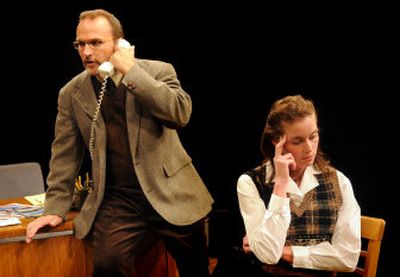No easy answers

There’s never been a middle ground in the battle between the sexes.
In David Mamet’s play “Oleanna,” that sense of singular perspective – colored in determinedly gender terms – wafts across the footlights and permeates the house, making it just as likely that you’ll leave the theater as set in your opinions as you are confused about what you’ve just witnessed.
Previewing tonight and opening Friday, the Spokane Interplayers Theatre production of “Oleanna” stars two Los Angeles actors, Piper Gunnarson and John Henry Whitaker, and is directed by a third, Karen Kalensky (who directed “The Clean House” at Interplayers in February).
Mamet’s play is, according to Kalensky, “a thought-provoking, riveting drama with a powerful ending that will stay with you long after you leave the theater. In the simple office setting of a university professor, his student confronts him about her grade and from there the play takes off down a road questioning boundaries, ethics and morality.”
What happens, then, is pure Mamet, which is to say that it’s a mind-blowing experience in dialectics, a study in language from the same guy who gave us such theater of the mind as “American Buffalo,” “Glengarry Glen Ross” and “Speed-the-Plow” – the first two of which were made into films.
Told in three acts, “Oleanna” (which was first produced in 1992, starring William H. Macy and Rebecca Pidgeon) involves two characters and a single setting. John is a middle-aged college professor, a bit smug, a bit pompous, yet seemingly not a bad man. Carol is his student, timid, diffident but maybe not as dense as she initially seems to be.
Their encounter is one that highlights Mamet’s gift for creating dialogue that is both riveting and nonspecific at once. During most of the play, the characters talk at, but not to, each other.
Carol has come to question John. While attempting to explain the facts as he sees them, John gradually finds himself on the defensive. Before long, he realizes that he has misread the whole situation. Or has he? Who is harassing whom, and is there anything sexual about the whole process?
In Act Two, set about three weeks later, the two begin again. This time, power has shifted. Now chastened, John is less arrogant. And an empowered Carol is less shy. But is he more understanding or simply anxious to placate? Has she suddenly become more aware or merely doctrinaire to a withering degree?
When Act Three begins, supposedly four days later, things get really interesting. But is anything ever made clear? And what, if anything, is resolved?
As former New York Times theater critic Frank Rich wrote in his original review, “John, the professor, and Carol, the student, do not talk around the issues that divide them or engage in pious philosophical debates that might eventually bring the audience to some logical, soothing resolution of the conflict. Instead, John and Carol go to it with hand-to-hand combat that amounts to a primal struggle for power.”
You’re likely to be engaging in that same kind of struggle with your date all the way to your car – and beyond.